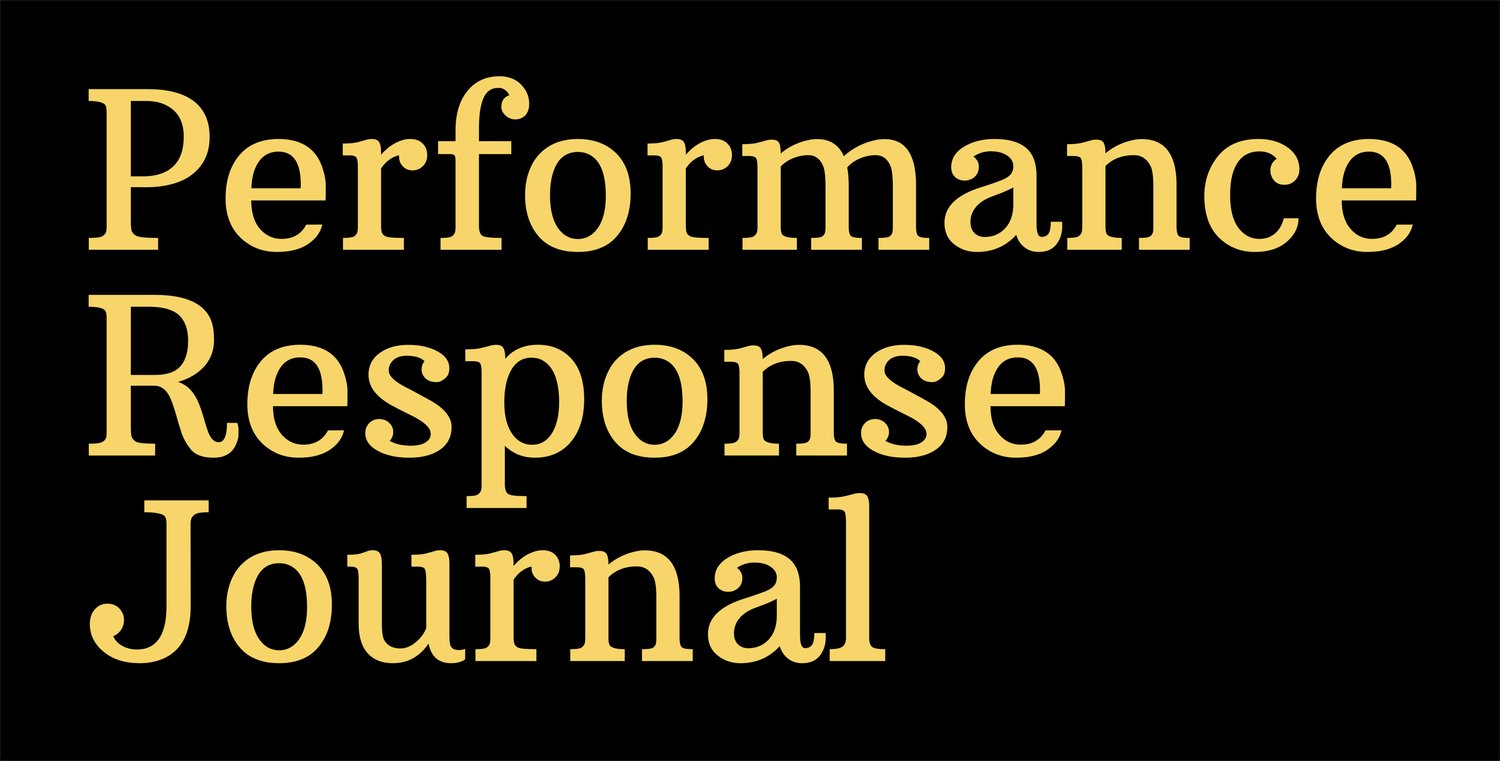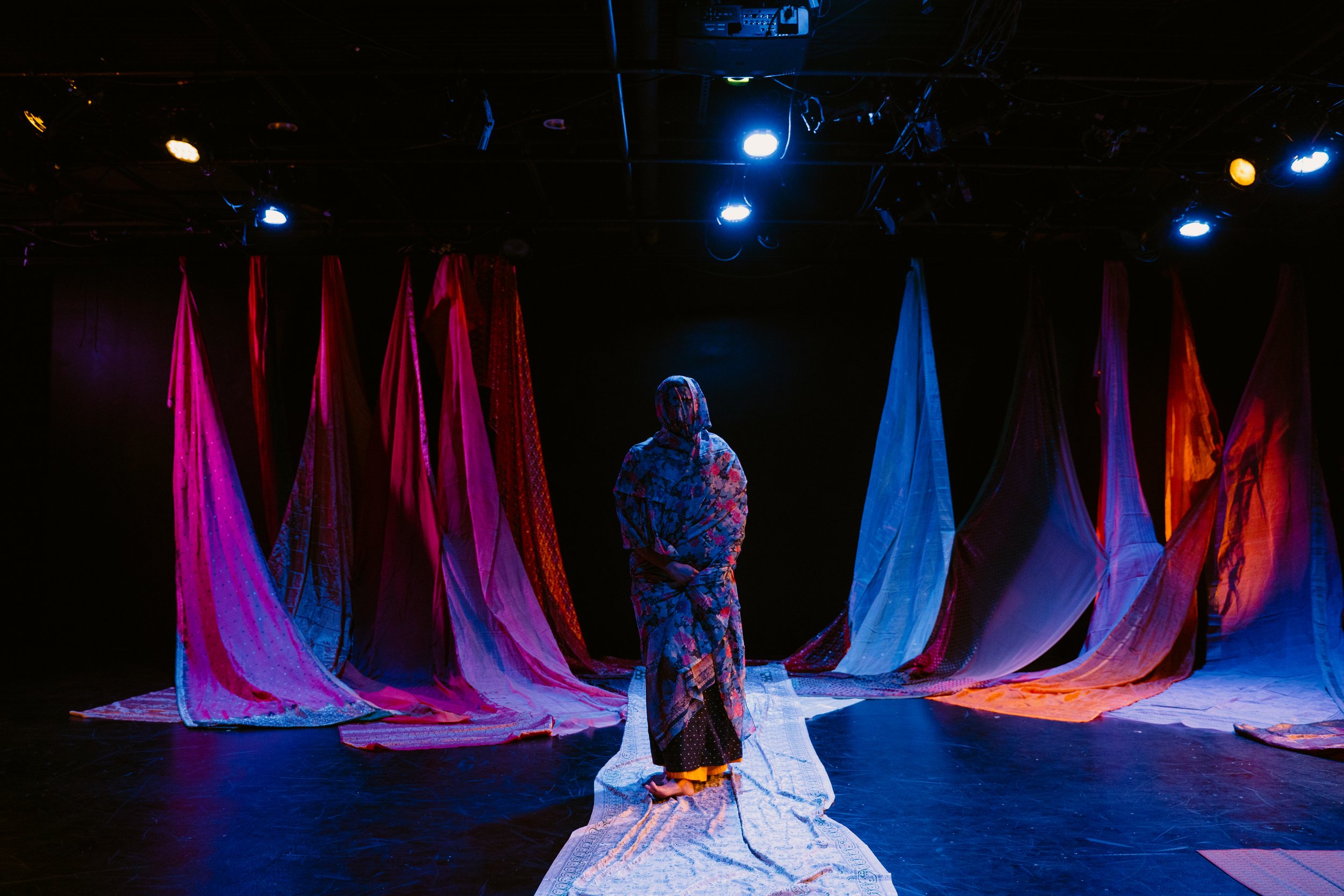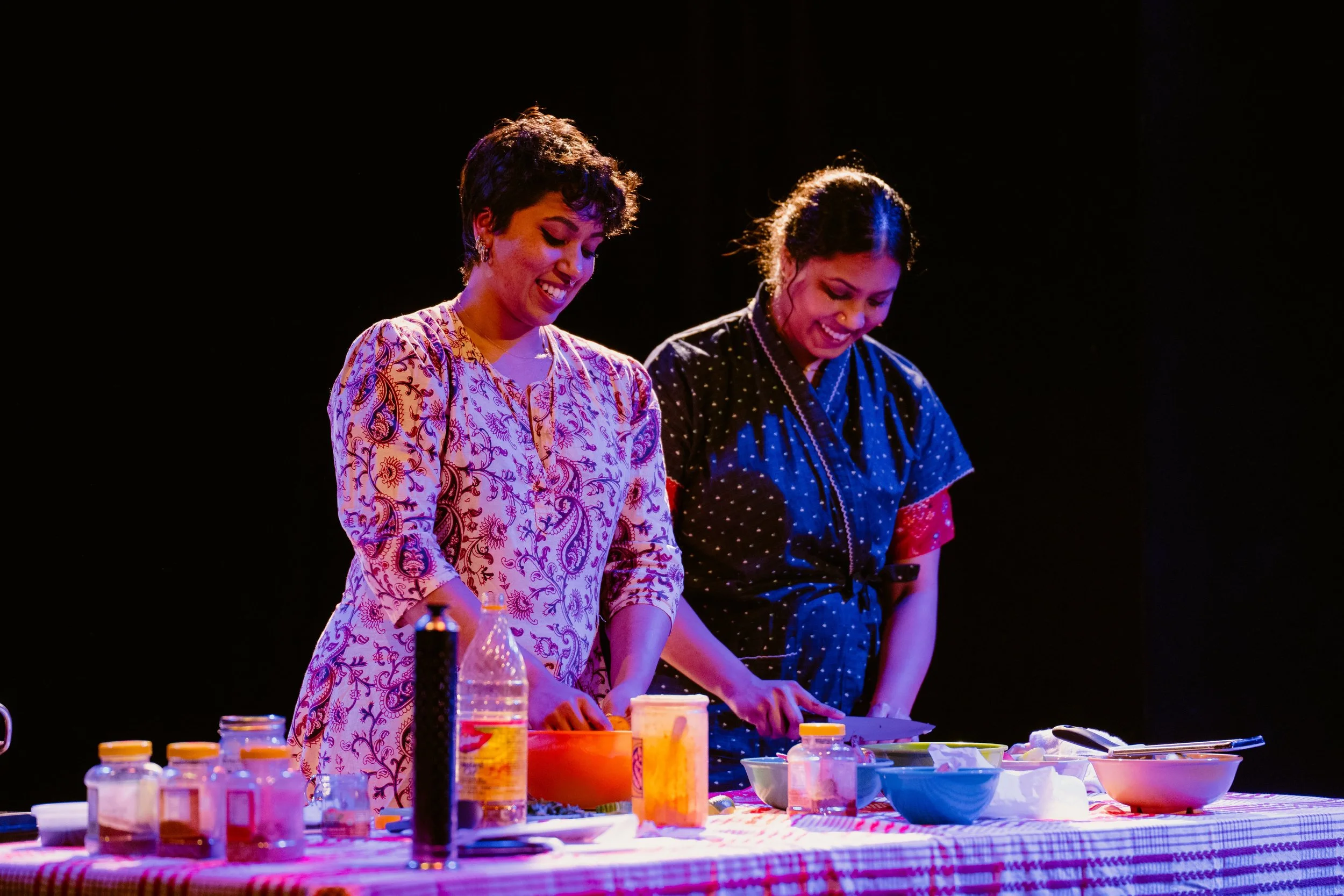Passed through lineages, in lands far and near: a response by Sarah Stearn
Image captured by Ricardo Adame
Bangali Meye - How Did You Get Here?
Artistic Direction: Tuli Bera
Performers: Tuli Bera, Anita (Tithi) Bera
Dramaturg: Darling Squire
Sound: Norah Jones, Rabindranath Tagore, Gauriprasanna Mazumdea, Hemant Kuma, Stars of the Lid
Presented as a part of work around series curated by Kara Brody & Amanda Maraist through Steppenwolf’s LookOut Series.
February 9-10, 2023
Steppenwolf 1700 Theater
**************************
Incense, cooking oil and warmth fill my nose, enticing me to enter the theater. There’s a sizzle, a careful knock of a wooden spoon on a pan. We gather in the kitchen around the food - in this case, the kitchen is two clothed tables topped with two electric stoves, spices and vegetables laid out for all to see. Tuli and her younger sibling, Tithi, have been here before, many times, in many different places and lands and lifetimes. They’ve brought their world to us now: there’s sound and smell and color, all senses awakened and calmed simultaneously. Tuli and Tithi encourage us to sniff the daal that’s been cooking before finding a seat.
Tuli’s introduction intentionally interwove credits, land acknowledgment, and gratitude. Her deliberate, thoughtful cadence made me listen and feel the importance of each word. The soft, steady pace in her voice invited me to lean into myself, take a deep breath, slow down, and be in this moment.
Tuli picks up the spoon with the utmost care, dips it into a steaming pot, glides it through the daal in a figure eight motion. The pan connected to the food connected to the spoon connected to her hand connected to her wrist to her arm to her heart… She’s done this before, many times, through lifetimes. And this time, Tuli stirs in front of us, this moment anew. Tuli recounts cooking sad and joyful daal, to “why doesn’t this taste like Ma’s daal” daal, to “this is for my sister” daal. Each daal reflects a fresh moment of being, a continuation of self. An ever changing, yet constant identity. Like daal, our essence as humans is constant, but each moment we present ourselves is new. Tuli is wrapped in this idea, investigating it in every moment of Bangali Meye: How did you get here?
Image captured by Ricardo Adame
Saris hang from the ceiling, and as Tuli stirs the pot and ponders “What is this indefinite becoming? What is this Bangali Meye?” Tithi emerges, wrapped in a sari, gliding across the back of the space. Just as she softly entered, her voice floated into the space with ease and serenity. As Tithi sings, she lays on the floor, rolling herself up in another sari, wrapping herself fully in all that it represents:
history, sensation, memory… home.
From the food to the saris to spice dusted hands and busy Kolkata streets projected on the wall to the stories of West Bengal… There is much to take in. After a brief moment in the kitchen with Tithi, full of familial banter and a sharing of memories in English and Bangali, Tuli is all-consumed and pulled back into the space to process.
Memories seep in through smells in the kitchen, songs in the ears, images on the wall, sounds in the streets, saris in the space… They hang in the air all around, ready to be snatched. Tuli reaches for them, plucks them with her fingers, brings them close, and absorbs the impact as they hit different parts of her body. Her eyes see these memories as if they are tangible. Her gaze is filled with longing, frustration, elation, question… At one point, so many surrounded her that her movement speeds up. At another point, she drops one into her mouth. Whatever she’s seeing, taking, and feeling, is here now, passed through lineages and alive within.
Tuli and Tithi pass the cooking of the daal seamlessly throughout the evening. As Tithi sings, Tuli cooks… As Tuli dances, Tithi cooks. They meet together in the middle and at the end of the piece, each time revealing something about their relationship and channeling their family history. Each time returning brings up other memories. Each time returning brings up something that allows Tuli to express, dig deeper, and come closer to this understanding of Bangali Meye.
Some of her first and last movements of the piece signal this re-emerging as well. Tuli moves close to the floor, with wrapping motions of her arms around her head. She kneels by a tool on the ground, and starts chopping a cucumber. After the performance, Tuli’s mother told me that this was how she used to chop vegetables in her hometown of Kolkata. Tuli returns to this place at the end of the piece, this time literally wrapped in a scarf, and repeats the same movement. Wrapped in history, memory, sensation… home.
Bangali Meye - How Did You Get Here? is a revelation of process, a peek into Tuli’s everyday experience. She constantly evolves in a cyclical nature before us in relation to her sibling and her ancestry. We’re left with a beautiful duet of a song that was passed down from Tuli and Tithi’s grandmother, “Ei Raat Tomar Amar (This Night is Yours and Mine),” and a warm feeling of self-acceptance.
Image captured by Ricardo Adame
**************************
Sarah Stearn is a dancer and arts administrator born and raised in the land of the Council of The Three Fires (occupied Kickapoo, Peoria, Potawatomi, Myaamia and Očhéthi Šakówiŋ territory), also known as Chicago. Previous written works about dance in Chicago can be found on Picture This Post. Currently, she curates the J e l l o Performance Series alongside Tuli Bera and Brice Hartmann out of Elastic Arts, where she is also a producer. She frequents dance classes at the Rooted Space, which has brought much joy and discipline back into her life since she started working full time at the Irving Park YMCA in Fall of 2022.




